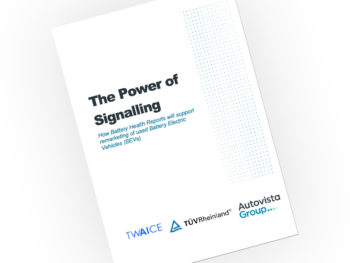Battery Health Reports could improve electric vehicle residual values
Autovista Group, TWAICE and TÜV Rheinland have found that Battery Health Reports (BHRs) could dramatically improve residual values for battery electric vehicles.

The free white paper explores whether Battery Health Reports are an answer to increasing residual values for electric vehicles
A new Whitepaper from Autovista Group, TWAICE and TÜV Rheinland examines how Battery Health Reports can create value for the automotive industry when it comes to selling used electric vehicles.
Used car buyers struggle to assess the true quality of electric vehicles due to them being a complex product to appraise and therefore they assume lower quality and pay less, hindering their true residual value potential.
“Used car programmes and extended warranties are already powerful signals that help address the information asymmetry between buyer and seller. But the BEV represents a new challenge for the market,” according to Christof Engelskirchen, chief economist at Autovista Group. “We know that how the battery is treated over the 8-10 years of its lifetime has a major impact on range and therefore suitability for daily use, but car manufacturers provide no systematic transparency on battery treatment and quality.”
Dr. Matthias Schubert, executive vice president mobility at TÜV Rheinland, added: “Numerous long-term tests have shown that the ageing pattern of EV batteries can vary widely amongst individual cases, depending on the user profile. An assessment of the remaining capacity and expected performance lifetime is a decisive precursor to establishing residual value.”
At the 3-year point with 45,000km (28,000 miles) on the clock, a battery that has been poorly treated will perform worse on promised range by about 5% – and this gap will only increase as battery quality, once lost, cannot be recovered.
Autovista Group has simulated that improved and verifiable battery quality, provided in the form of a Battery Health Report, delivers up to €450 higher remarketing results for a three-year-old used C-segment BEV in Germany.
“That represents an economic value of €4.5m (£3.96m) for every 10,000 BEV used-car transactions – to the benefit of all stakeholders,” explains Engelskirchen.
One challenge remains, according to Lennart Hinrichs, Commercial Director at TWAICE: “What we are working on now is establishing battery health report as a standard in the industry.
The full potential of BHRs can only be realised if information on battery treatment becomes available as a standard data item on every used BEV transaction, similar to information on age, mileage and equipment. Figuring out how to make BHRs an industry standard is the next challenge, though it appears clear that it would be a win-win for both the seller, buyer and offering pricing clarification for the industry.
For more information on how Battery Health Reports can create value to the automotive industry, download a FREE copy of our collaborative Whitepaper.

